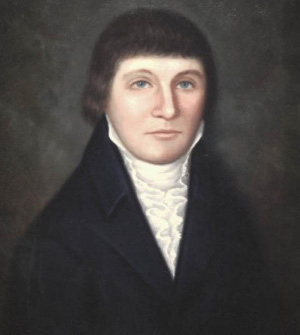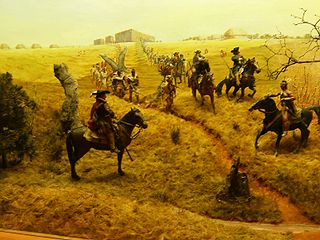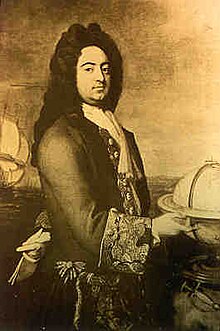
The governments of the Thirteen Colonies of British America developed in the 17th and 18th centuries under the influence of the British constitution. The British monarch issued colonial charters that established either royal colonies, proprietary colonies, or corporate colonies. In every colony, a governor led the executive branch, and the legislative branch was divided into two houses: a governor's council and a representative assembly. Men who met property qualifications elected the assembly. In royal colonies, the British government appointed the governor and the council. In proprietary colonies, the proprietors appointed the governor and his council. In corporate colonies, voters elected these officials.

Richard Caswell was an American politician and lawyer who served as the first and fifth governor of the U.S. state of North Carolina from 1776 to 1780 and from 1785 to 1787. He also served as a senior officer of militia in the Southern theater of the American Revolutionary War. As a delegate to the First Continental Congress, he was a signatory of the 1774 Continental Association.
Robert Johnson (1682–1735) served as the governor of South Carolina from 1717 to 1719 and from 1729 to 1735. Johnson ordered Colonel William Rhett to engage the notorious pirate Stede Bonnet's sloops in the Battle of Cape Fear River with the Charleston Militia on sea in 1718. His grandson was South Carolina Senator Ralph Izard.

The Province of South Carolina, originally known as Clarendon Province, was a province of the Kingdom of Great Britain that existed in North America from 1712 to 1776. It was one of the five Southern colonies and one of the thirteen American colonies of the British Empire. The monarch of Great Britain was represented by the Governor of South Carolina, until the colonies declared independence on July 4, 1776.

The Province of North Carolina, originally known as Albemarle Province, was a proprietary colony and later royal colony of Great Britain that existed in North America from 1712 to 1776.(p. 80) It was one of the five Southern colonies and one of the thirteen American colonies. The monarch of Great Britain was represented by the Governor of North Carolina, until the colonies declared independence on July 4, 1776.

The Province of Carolina was a province of the Kingdom of England (1663–1707) and later the Kingdom of Great Britain (1707–1712) that existed in North America and the Caribbean from 1663 until the Carolinas were partitioned into North and South in 1712.

The Granville District was an approximately 60-mile wide strip of land in the North Carolina colony adjoining the boundary with the Province of Virginia, lying between north latitudes 35° 34' and 36° 30'. From 1663 until 1779, the District was held under control of the descendants of Sir George Carteret, one of the original Lords Proprietors of the Province of Carolina. After 1729, the Granville District's land allotment totaled nearly half of the land in North Carolina.

Rawlins Lowndes was an American lawyer, planter and politician who became involved in the patriot cause after his election to South Carolina's legislature, although he opposed independence from the Kingdom of Great Britain. Lowndes served as president/governor of South Carolina during the American Revolutionary War, and after the war opposed his state's ratification of the Constitution of the United States because it would restrict the trans-Atlantic slave trade. Lowndes also served as a state legislator and mayor of Charleston before his death. Two of his sons, Thomas and William Lowndes, would serve in the U.S. Congress.

James Moore Sr. was a military officer and colonial administrator who served as the governor of Carolina from 1700 to 1703. He is best known for leading several invasions of Spanish Florida during Queen Anne's War, including attacks in 1704 and 1706 which wiped out most of the Spanish missions in Florida. He captured and brought back to Carolina as slaves thousands of Apalachee.
A lord proprietor is a person granted a royal charter for the establishment and government of an English colony in the 17th century. The plural of the term is "lords proprietors" or "lords proprietary".

The colonial period of South Carolina saw the exploration and colonization of the region by European colonists during the early modern period, eventually resulting in the establishment of the Province of Carolina by English settlers in 1663, which was then divided to create the Province of South Carolina in 1710. European settlement in the region of modern-day South Carolina began on a large scale after 1651, when frontiersmen from the English colony of Virginia began to settle in the northern half of the region, while the southern half saw the immigration of plantation owners from Barbados, who established slave plantations which cultivated cash crops such as tobacco, cotton, rice and indigo.
South Carolina was outraged over British tax policies in the 1760s that violated what they saw as their constitutional right to "no taxation without representation". Merchants joined the boycott against buying British products. When the London government harshly punished Massachusetts for the Boston Tea Party, South Carolina's leaders joined eleven other colonies in forming the Continental Congress. When the British attacked Lexington and Concord in the spring of 1775 and were beaten back by the Massachusetts Patriots, South Carolina Patriots rallied to support the American Revolution. Loyalists and Patriots of the colony were split by nearly 50/50.
The Yamasee War was a conflict fought in South Carolina from 1715 to 1717 between British settlers from the Province of Carolina and the Yamasee, who were supported by a number of allied Native American peoples, including the Muscogee, Cherokee, Catawba, Apalachee, Apalachicola, Yuchi, Savannah River Shawnee, Congaree, Waxhaw, Pee Dee, Cape Fear, Cheraw, and others. Some of the Native American groups played a minor role, while others launched attacks throughout South Carolina in an attempt to destroy the colony.

A charter is a document that gives colonies the legal rights to exist. Charters can bestow certain rights on a town, city, university, or other institution.
The Provincial Congresses were extra-legal legislative bodies established in ten of the Thirteen Colonies early in the American Revolution. Some were referred to as congresses while others used different terms for a similar type body. These bodies were generally renamed or replaced with other bodies when the provinces declared themselves states.
James Moore was an American military officer who served in the Continental Army during the American Revolutionary War. Moore was born into a prominent political family in the colonial Province of North Carolina, he was one of only five generals from North Carolina to serve in the Continental Army. He spent much of his childhood and youth on his family's estates in the lower Cape Fear River area, but soon became active in the colonial military structure in North Carolina.
Nicholas Trott was an 18th-century British judge, legal scholar and writer. He had a lengthy legal and political career in Charleston, South Carolina and served as the colonial chief justice from 1703 until 1719. He came from a prosperous English family; his grandfather Perient Trott having been a husband of the Somers Isles Company and his uncle Sir Nicholas Trott served as the governor of the Bahamas. Like his nephew, the governor was involved in dealings with pirates, and so, to avoid confusion, is often referred to as Nicholas the Elder.
James Colleton was a governor of the English proprietary Province of Carolina from 1686 to 1690.
Robert Gibbes was an English Landgrave, chairman and acting governor of the province of South Carolina between 1710-1712. Although he was elected acting governor by the Executive Council between the three proprietary deputies of former governor, Edward Tynte, after his death, received one vote more than his opponent Thomas Broughton, getting it through bribery. This sparked a conflict between both the oppositions and their supporters which finished with the Lords Proprietors declaring the election of Gibbes illegal and the appointment of Charles Craven as governor of South Carolina in 1711, who didn't arrive until 1712.











